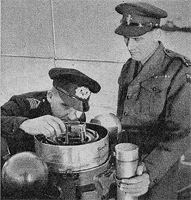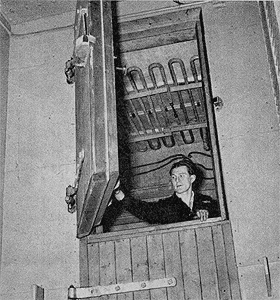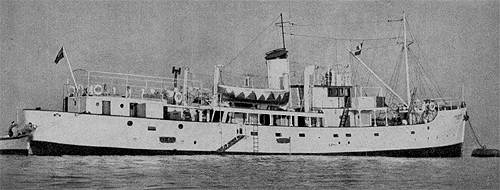The Army
Starts a Meat Run
The RASC
Fleet’s latest vessel carried meat
fish and passengers about the Middle East
The
Royal Army Service Corps Fleet is nothing if not versatile. To its
freighters, landing-ships, target-towing craft and launches, it has
now added anew type of craft, a refrigeration ship.
Her name
is Prospect and her first posting is to the Middle East for three
years. She will ply between the “meat stations” –
the principal ones are Malta and Cyprus – and the rest of the
Middle East, carrying frozen meat and fish.
The Prospect
started life in Canada. She was launched in Ontario in 1942 and joined
the Royal Navy as an “Isles” class trawler, one of the
small craft which, among other duties, escorted the Murmansk convoys
armed with depth-charges.
Last year she went into a Scottish dock-yard for a complete refit
and to be converted from coal to oil-burning. Then her deep forward
hold became three refrigeration chambers. Just before Christmas she
joined the Army.
At Sheerness, the Prospect took on stores, a complicated business
since there were no fewer than 2500 items. Most of them, including
emergency apparatus such as light signals and rockets, came from the
RASC Fleet’s No. 1 Boat Store Depot at Barry, Glamorgan, which
can supply any-thing from a new ship’s engine to a tumbler .
Other stores like bedding and cordage, were provided by the Royal
Army Ordnance Corps, and the Royal Navy completed the list with items
such as cabin carpets. At Sheerness, too, finishing touches were put
to the Prospect’s paint-work and in due course she was ready
for a War Office inspection before sailing for Port Said at the beginning
of January.
Posted to take command of the RASC Fleet’s newest vessel was
the master of the Fleet’s oldest ship (and incidentally the
oldest ship on Lloyd’s Register), the 70 year old coaster, Marquess
of Harlington. He is Mr. A.C. Clarke, who has been 14 years in the
RASC Fleet, he has been stationed in West Africa, Iceland and Orkney
as well as at home ports.

The
master, Mr. A.C. Clarke, checks his azimuth, watched by
Major
E.J. Robinson, Inspector of the RASC Fleet
Mr. Clarke’s
new command is small and compact and to the landsman, presents a bewildering
series of vertical ladders to climb. She displaces 482 tons gross,
is 165 feet long and 26 feet in the beam. She cruises at nine knots,
but on her trials touched 13. She burns seven-and-a-half tons of fuel
oil in a day and carries 94 tons, giving her a range of more than
2500 miles. Her crew totals 19 and she also has “officer accommodation”
for ten passengers. The passengers sleep in staterooms, eat and relax
in a saloon as compact as the rest of the ship, and have the only
sloping stairway on board.
“She is a beautiful little ship” says her master. “She
is lively in rough sea, but she will go through anything”.
Equally satisfied with his new ship is her chief engineer, Mr. E.
Isaacs. He has served in RASC vessels of all kinds and considers the
Prospect’s triple-expansion steam engine the most reliable afloat.
The Prospect’s refrigeration chambers will hold 40 tons of meat,
which does not seem a great deal at first. However, the Inspector
of the RASC Fleet, Major E.J. Robinson (recently transferred to the
Royal Electrical and Mechanical Engineers as part of REME’s
Phase Two) points out that at half a pound a man, 40 tons of meat
represents 179,200 rations, enough to keep a small garrison going
for some time.

The
Refridgeration Officer, Mr. A.W. Barnard, in his own department
He
also works in the ship's engine-room
“The
Prospect” adds Major Robinson, “has the advantage that
she draws only about 15 feet and can visit places which cannot take
bigger ships. She is intended to serve smaller garrisons, but she
could do the run from Cyprus to Port Said, for instance, twice in
about a week”.
The temperature in the refrigerators can be brought down to ten degrees
Fahrenheit, which is low enough to keep meat and fish indefinitely.
It is also low enough to put the Prospect into the frozen fruit and
vegetable trade if necessary. The refrigeration plant is normally
powered from the ship’s boiler, but there is also an auxiliary
diesel motor which would keep it working during boiler-cleaning.
|


